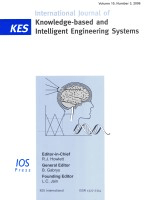
International Journal of Knowledge-Based and Intelligent Engineering Systems
Scope & Guideline
Exploring the Synergy of AI and Engineering Excellence
Introduction
Aims and Scopes
- Multi-Attribute Decision-Making (MADM):
The journal emphasizes methodologies for multi-attribute decision-making, employing various fuzzy and neutrosophic approaches to address complex decision scenarios across different domains. - Intelligent Systems and Algorithms:
Research related to the development and application of intelligent algorithms, including machine learning, artificial intelligence, and optimization techniques, is a core focus, particularly in enhancing decision-making processes. - Applications in Diverse Fields:
The journal showcases applications of knowledge-based systems in various fields such as education, healthcare, environmental management, and engineering, demonstrating the practical impact of research findings. - Fuzzy Logic and Neutrosophic Theory:
A significant portion of the journal's articles explores fuzzy logic and neutrosophic theories, providing innovative frameworks for handling uncertainty and imprecision in decision-making. - Data Analytics and Decision Support:
The integration of big data analytics with decision-support systems is highlighted, showcasing how advanced data processing techniques can enhance the effectiveness of decision-making frameworks.
Trending and Emerging
- Advanced Fuzzy and Neutrosophic Decision-Making Techniques:
There is an increasing trend in the development and application of advanced fuzzy and neutrosophic decision-making techniques, which are being applied to complex evaluation problems across various domains. - Integration of Big Data and AI:
The integration of big data analytics with artificial intelligence techniques is becoming a prominent theme, as researchers explore how these technologies can enhance decision-making processes and outcomes. - Real-Time and Intelligent Systems:
Emerging research focuses on real-time applications of intelligent systems, particularly in areas like autonomous vehicles and dynamic data processing, highlighting the growing importance of real-time decision-making capabilities. - Sustainability and Energy Efficiency:
Sustainability-related themes, particularly energy efficiency and environmental impact assessments, are increasingly prevalent, reflecting a broader societal focus on sustainable development and resource management. - Educational Technology and Evaluation:
The application of intelligent decision-making frameworks in educational settings, particularly regarding teaching quality and learning evaluations, is gaining attention, indicating a trend towards improving educational outcomes through technology.
Declining or Waning
- Traditional Decision-Making Frameworks:
There is a noticeable decline in the publication of articles utilizing traditional decision-making frameworks that do not incorporate advanced fuzzy or neutrosophic approaches, as the journal increasingly favors innovative methodologies. - Basic Machine Learning Techniques:
Basic or introductory machine learning techniques are appearing less frequently, as more complex and hybrid methodologies take precedence, indicating a shift toward advanced applications and integrations. - General Optimization Techniques:
Research centered on general optimization techniques without the integration of intelligent systems or advanced algorithms is becoming less common, suggesting a preference for more sophisticated approaches. - Non-application-focused Research:
The journal is moving away from purely theoretical discussions that lack practical applications, favoring studies that demonstrate clear applications of knowledge-based systems in real-world scenarios.
Similar Journals

Fuzzy Information and Engineering
Unlocking Potential in Control Systems and Artificial IntelligenceFuzzy Information and Engineering is a prestigious open access journal recognized for its contributions to the interdisciplinary fields of applied mathematics, control systems engineering, artificial intelligence, and information systems, published by TSINGHUA UNIVERSITY PRESS. With an impact factor that reflects its increasing influence, the journal has maintained a strong position in the academic community since its inception in 2011, converging its focus between 2014 and 2024. The journal is indexed in notable databases such as Scopus, demonstrating solid rankings across its categories, including a commendable Q3 classification in applied mathematics and control systems engineering. By fostering innovative research and disseminating key findings, Fuzzy Information and Engineering serves as a vital platform for researchers, professionals, and students alike, promoting advancements in fuzzy systems and their applications within diverse domains. Notably, since transitioning to an open access model in 2015, the journal has enhanced accessibility for a global audience, encouraging collaborative efforts in academia and industry.
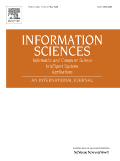
INFORMATION SCIENCES
Navigating the Future of Information ScienceINFORMATION SCIENCES, published by Elsevier Science Inc, is a premier peer-reviewed journal that has become instrumental in advancing the field of information science since its inception in 1968. With an impressive array of quartile rankings in 2023, including Q1 in Artificial Intelligence, Computer Science Applications, Control and Systems Engineering, Information Systems and Management, Software, and Theoretical Computer Science, this journal serves as a vital resource for researchers and professionals looking to explore cutting-edge theories and practical applications within these domains. The journal is indexed extensively, with notable Scopus rankings, reflecting its significance and influence in the academic community—ranked 6th in Theoretical Computer Science and 10th in Information Systems and Management, among others. Although it does not currently offer an open-access option, the depth of research published within INFORMATION SCIENCES ensures that it remains a key reference point for advancing academic inquiry and addressing complex challenges in the information landscape.
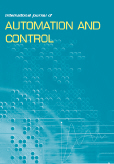
International Journal of Automation and Control
Exploring Excellence: Your Gateway to Cutting-Edge Research in Automation.Welcome to the International Journal of Automation and Control, a vital platform for research and discussion in the fields of Control and Systems Engineering, Hardware and Architecture, Industrial and Manufacturing Engineering, and Software. Published by InderScience Enterprises Ltd since 2007, this journal has gained recognition for its high-quality articles and innovative approaches, holding Q3 rankings in its primary fields and a commendable Q2 designation in Industrial and Manufacturing Engineering. While offering a robust mix of theory and practical applications, it aims to bridge the gap between academia and industry, fostering advancements in automation technologies. Researchers, professionals, and students will find invaluable insights and critical analysis that contribute to the evolving landscape of automation and control systems. Although currently not open access, the journal provides a comprehensive archive until 2024, ensuring accessibility to groundbreaking research that shapes the future of engineering. Join a community dedicated to exploring the challenges and achievements in automation and control.

Journal of Advanced Computational Intelligence and Intelligent Informatics
Advancing Knowledge in Computational IntelligenceThe Journal of Advanced Computational Intelligence and Intelligent Informatics, published by FUJI TECHNOLOGY PRESS LTD, stands as a pivotal platform in the fields of Artificial Intelligence, Computer Vision, and Human-Computer Interaction. Established in 1997, this Open Access journal has been providing accessible insights into the latest advancements in computational intelligence and informatics since 2007. With its ISSN 1343-0130 and E-ISSN 1883-8014, this journal invites a diverse readership, including researchers, professionals, and students eager to explore innovative methodologies and applications. Despite its current Q4 ranking in the relevant categories, the journal remains committed to contributing valuable knowledge to the academic community and enhancing the global discourse in computational technologies. With its focus on fostering communication and collaboration among scholars, the journal plays an essential role in driving forward the understanding of intelligent systems and their applications in various domains.
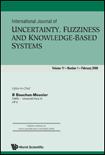
INTERNATIONAL JOURNAL OF UNCERTAINTY FUZZINESS AND KNOWLEDGE-BASED SYSTEMS
Advancing methodologies for a clearer understanding of uncertainty.Welcome to the INTERNATIONAL JOURNAL OF UNCERTAINTY FUZZINESS AND KNOWLEDGE-BASED SYSTEMS, a prestigious publication dedicated to advancing the fields of artificial intelligence, control systems engineering, information systems, and software research. Published by WORLD SCIENTIFIC PUBL CO PTE LTD in Singapore, this journal serves as a vital forum for the dissemination of innovative theories, methodologies, and applications rooted in the coexistence of uncertainty and fuzziness within knowledge-based systems. With its ISSN 0218-4885 and E-ISSN 1793-6411, the journal consistently ranks in the Q3 category across various Scopus categories, including Control and Systems Engineering and Information Systems, reflecting its influential position in the academic community. Researchers and practitioners alike will find valuable insights and the latest trends through its comprehensive articles, making this journal an essential resource for those seeking to navigate the complexities of this evolving field.
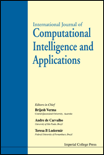
International Journal of Computational Intelligence and Applications
Unveiling the Future of Intelligent Computing SolutionsThe International Journal of Computational Intelligence and Applications, published by WORLD SCIENTIFIC PUBL CO PTE LTD, is a prominent journal dedicated to advancing the field of computational intelligence and its applications, with a keen focus on innovative methodologies and theoretical frameworks. With an impact factor reflective of its growing influence, the journal is classified in Q3 for Computer Science Applications and holds Q4 standings in both Software and Theoretical Computer Science as of 2023, showcasing its critical niche within these disciplines. Established in 2008 and converging through 2024, this journal serves as a vital resource for researchers, professionals, and students in Singapore and beyond, promoting scholarly communication and collaboration. Although it is a non-open access journal, it still provides a wealth of information that is readily accessible through institutional subscriptions and library resources. Researchers contributing to the journal benefit from its wide reach and dedicated readership, making it a substantial platform to disseminate groundbreaking research and insights.

Intelligent Decision Technologies-Netherlands
Unveiling the Potential of Intelligent Systems for Tomorrow.Intelligent Decision Technologies-Netherlands, published by IOS PRESS, is an emerging journal dedicated to the dynamic fields of Artificial Intelligence, Computer Vision, and Human-Computer Interaction. Established in 2007 and continuing through 2024, this journal aims to foster interdisciplinary research and innovation by providing a platform for cutting-edge studies and applications of intelligent systems. While its current impact factor reflects a growing influence within the scientific community, with quartile rankings ranging from Q3 to Q4 in various pertinent disciplines, Intelligent Decision Technologies plays a pivotal role in shaping future research directions. Although the journal does not offer open access, it remains accessible across academic institutions, encouraging researchers, professionals, and students to contribute to and engage with the latest advancements in decision technologies. With a commitment to quality and relevance, this journal seeks to advance knowledge and enhance the understanding of intelligent systems in today's rapidly evolving technological landscape.
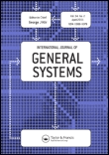
INTERNATIONAL JOURNAL OF GENERAL SYSTEMS
Bridging Disciplines through Systems ThinkingThe INTERNATIONAL JOURNAL OF GENERAL SYSTEMS, published by TAYLOR & FRANCIS LTD, is a prestigious peer-reviewed journal dedicated to advancing the fields of systems theory and its applications across a variety of scientific disciplines. With an ISSN of 0308-1079 and an E-ISSN of 1563-5104, this journal has carved a niche since its inception in 1974, continuing to provide a platform for innovative research through to 2024. Featured in the esteemed Q2 category in multiple domains, including Computer Science Applications, Control and Systems Engineering, and Information Systems, it serves as a vital resource for the scientific community, fostering interdisciplinary collaboration. The journal's rankings in Scopus reflect its quality, with noteworthy positions in fields such as Mathematics, Engineering, and Theoretical Computer Science. While access is through subscription, the journal remains an essential conduit for researchers, professionals, and students eager to deepen their understanding of general systems and their complex interactions within various environments.
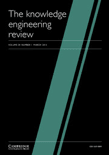
KNOWLEDGE ENGINEERING REVIEW
Driving Excellence in Artificial Intelligence and Software DevelopmentKNOWLEDGE ENGINEERING REVIEW, published by Cambridge University Press, is a prestigious academic journal dedicated to the dynamic fields of Artificial Intelligence and Software Engineering. With an ISSN of 0269-8889 and an E-ISSN of 1469-8005, this journal has been a pivotal platform for scholarly communication since its inception in 1984, with its impact continuously recognized through its Q2 category ranking in both fields as of 2023. Operating from its headquarters in the United Kingdom, it boasts a robust Scopus ranking, placing it in the 73rd percentile for Software and the 69th percentile for Artificial Intelligence, a testament to its influence and relevance. Though it does not offer open access, the journal remains dedicated to advancing knowledge engineering by publishing high-quality research articles, insightful reviews, and innovative methodologies that address both theoretical and practical challenges. Researchers, professionals, and students find this journal an invaluable resource for cutting-edge developments in the realm of knowledge engineering.
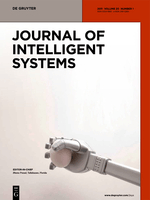
Journal of Intelligent Systems
Diving Deep into Intelligent Systems and SolutionsThe Journal of Intelligent Systems, published by DE GRUYTER POLAND SP Z O O, is a premier open access journal that has been at the forefront of advancements in the fields of Artificial Intelligence, Information Systems, and Software Engineering since its inception in 1991. With a commitment to disseminating high-quality research, the journal has been recognized in the 2023 category quartiles as Q3 in these critical areas, reflecting its relevance and impact in the academic community. The journal serves as a vital platform for researchers, professionals, and students interested in the evolving landscape of intelligent systems, offering insights into innovative methodologies and applications. As an open access publication since 2020, it ensures that research is readily available to a global audience, fostering collaboration and engagement within the scientific community. With a Scopus rank in the 65th to 69th percentiles across its categories, The Journal of Intelligent Systems continues to contribute significantly to the discourse on intelligent technologies and their implications for the future.